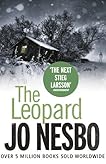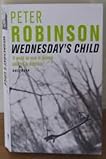 The Leopard by Jo Nesbø
The Leopard by Jo NesbøMy rating: 3 of 5 stars
This is the third book I have read by Jo Nesbø, where the protagonist is Oslo detective Harry Hole. The book opens with Harry on indefinite leave, hiding out in the opium dens of Hong Kong, and being brought back to solve a serial murder case -- two women have been found dead, drowned in their own blood.
I haven't read the book immediately preceding this one in the series, The snowman, which apparently explains why Harry was in Hong Kong, and perhaps one needs to read that to understand what happens in this novel, but I found it rather disappointing. The first book I read about Harry Hole, The redeemer I thought pretty good, the best of the flood of Scandinavian whodunits I'd read to date. So what was wrong with this one?
I suspect that Jo Nesbø has been influenced by the success of Stieg Larsson, and has been trying to imitate Larsson's style, and it doesn't quite come off. In most whodunits, the reader is exposed to clues as the detectives are, and has to work out the most likely suspects based on the same information, and that is part of the fun of reading whodunits. In this book, however, the reader has more knowledge than the detectives, and thus can work out the primary suspect long before they do. I won't go into the possible reasons for this, as that would probably be a spoiler.
In addition, Nesbø comes perilously close to jumping the shark by giving Harry Hole not one, but three near-death experiences. The book ends as it begins, with Harry Hole retiring to obscurity. I don't think that's a spoiler, but I do think that this time it's probably best if he stays there.
 Wednesday's Child by Peter Robinson
Wednesday's Child by Peter RobinsonMy rating: 4 of 5 stars
A child is abducted from her mother's home by a couple posing as social workers, and while the police are looking for her the body of a murdered man is discovered. A good read.
View all my reviews
These two books provide an interesting contrast between British and Scandinavian whodunits. I'd read some of Peter Robinson's later books about Yorkshire detective Alan Banks, and recently a lot of the earlier ones have been reprinted, in more compact editions (take up less shelf space) and they also seem to be available fairly cheaply, so I've been starting from the beginning and gradually working through them.
Like Harry Hole, Alan Banks drinks and smokes, but unlike the protagonists in so many of the Scandinavian whodunits, including Harry Hole, he isn't an alcoholic. Earlier generations of detective fiction usually pitted talented amateur detectives against bumbling incompetent policemen (Conand Doyle, Agatha Christie) or else the police admired the talents of the amateur (Dorothy Sayers, G.K. Chesterton).
Robinson belongs to the more realistic version, where the protagonist is a police detective and an ordinary human being with ordinary human failings, with strengths as well as weaknesses. I don't know much about police procedure, but Alan Banks is at least credible. Harry Hole, however, stretches the limits of credibility, though not in the same way that the earlier talented amateur fictional detectives did. One simply cannot imagine the Norwegian police putting so much time and money and effort into bringing back a washed-up alcoholic ex-ace detective from the other side 0of the world to solve a murder mystery that they cannot solve without him.
I try to imagine a sequel.
Harry Hole in the intensive care unit of a home for recovering alcoholics, being consulted by rival factions of the Norwegian police and Interpol, who have to bribe the doctors to delay Harry's recovery by giving him stimulants to bring him out of his coma for long enough to tell them howe to catch the villains, and coming out of his coma on his own for long enough to foil the villains intent of switching off his life-support system.
1 comment:
Greatly appreciate that because I was at a bookstore, looking at the shelves and realizing I knew none of the authors. Now I do.
Post a Comment